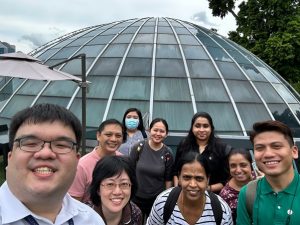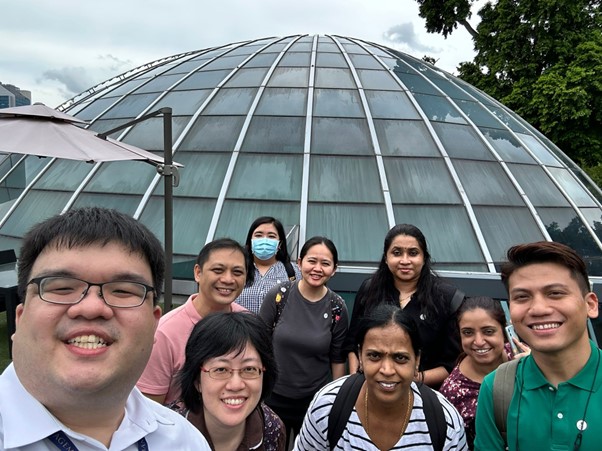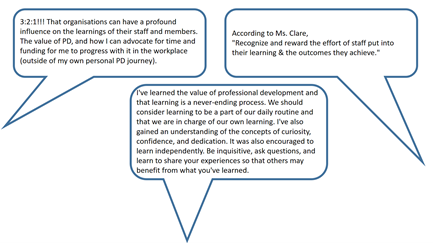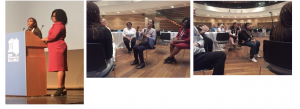Recently, Bryan Leow, Associate Librarian, Law from Singapore Management University Libraries (“SMU Libraries”) hosted participants in the ‘A Day in the Life’ Programme (“the Programme”) from other Singapore university libraries.
About the ‘A Day in the Life’ Programme
The Programme was developed in 2013 by an executive planning team comprised of representatives from Nanyang Technological University Libraries (“NTU Libraries”), National University of Singapore Libraries (“NUS Libraries”) and Singapore Management University Libraries (“SMU Libraries”). The draft terms of reference also note that the Programme was “a collaborative staff development programme for Singapore Universities library staff which promotes broad understanding of academic library environments, open sharing of good practices, and connecting with colleagues across libraries”.
To this end, the Programme aims to:
- Provide opportunities for staff to have exposure to the operations and management of other academic libraries in a short, condensed, practical and simple way;
- Provide networking opportunities for those staff so that they can keep in touch with each other for subsequent follow-up and collaboration; and
- Provide opportunities for the staff of host organisations in gaining experience and confidence to plan and present about their own library to visitors, i.e., the programme will be delivered (as much as practicable) not by Heads of Departments/Divisions but by the staff working in those units.
The Programme’s intended audience are professional library staff (or equivalent), with a preference for staff with no prior experience working in an academic library; as well as those who have worked in a particular library for a long time and would benefit from being exposed to another academic library.
The Programme takes place twice a year. During each run, three nominated institutions act as ‘host’ institutions. Each host institution puts together their own programme that typically provides and overview of their library, core functions of the library highlighting services and functional departments and provide networking opportunities. Participants get to spend a full day at each host institution (3-day programme) and the Programme is open to one participant per academic institution (maximum of seven participants per run). Each participant is required to prepare a brief reflective report which is submitted to the executive planning team and annually submitted to the University Librarians of participating institutions. Some participants also share their experiences using various platforms such as staff meetings or writing.
Back on Track and in their Own Words
This year, following a hiatus of the Programme during the COVID pandemic, SMU Libraries, together with The Ngee Ann Kongsi Library, Singapore Institute of Technology (SIT Library) and NUS Libraries hosted the Programme in November 2022. As a recent hire, Bryan was nominated as the SMU Libraries participant. He also put together the SMU programme which involved presentations, sharing of best practices, demonstration of tools and applications used for work, tours, and an important Reflection segment at the end of the day, which was facilitated by Rajen Munoo, Head, Learning and Engagement.
Wearing his IFLA, Continuing Professional Development and Workplace Learning (“CPDWL”) Section Member hat, Rajen asked participants to pen their thoughts to the following question: Why is it important to have continuing professional development activities?
Below are some of their thoughts in their own words:
Participant 1: “It is important to stay relevant as the world keeps changing…Important to exchange knowledge, be open to ideas, learn from the others”
Participant 2: “It is important for us to have professional development activities as they give us a chance to learn about what other institutions are working on, how we can collaborate, network and do better. It gives us an opportunity and open our mind and think creatively.”
Participant 3: “The library/academic scene is changing rapidly e.g., moving into electronic resources, more interdisciplinary learning. Development is needed to stay relevant and to keep up to date with the latest changes.”
Participant 4: “Share ideas with others. Share how challenges were resolved. Students and staff need continually changes, and so…library must keep up with the times.”
Participant 5: “No professional is an island. Like, research, the professional work also should be made open to grow and contribute to the society (library) as one.”
Participant 6: “Staying relevant is crucial as technology evolves – information is readily available in just one click. Professional development programmes allow us to connect with other librarians or experts where we can continue to learn.”
Participant 7: “Teaching and learning are always evolving, so is technology continually improving and adapting to the changes and in response to the needs of faculty and students. Hence, the library and librarians must always engage in exploring new avenues of thought, learning from one another so that all SG libraries are not left behind in this digital innovative age.”
Participant 8: “It is as simple as for personal self-development and remain relevant not just for the present state but also future. It allows us to collaborate and share greater knowledge with one another to deliver greater value to our stakeholders. A win win situation.”
Bryan too, noted that, “This Programme was very useful for me to better understand how other university libraries work, and to get a sense of the challenges they also face. I was also glad to get to know more people within the different universities, which would definitely come in handy for future collaborations between university libraries.”
From the reflections above, keywords such as change rapidly, sharing, collaboration, evolving, knowledge, staying relevant, digital innovation, how libraries work, keeping up with the times and more. Participant 5’s comment, is worth re-reading. As new professionals, it is important to start thinking about career paths and planning and having the relevant skills and competencies in hybrid working environments is essential as part of the digital transformation taking place in all libraries.
A Day in the Life Programme is an example of a CPDWL activity that has been a successful collaboration amongst university libraries in Singapore and is a simple model that can be adopted quickly by others.

Written by
- Bryan Leow, Associate Librarian, Law, SMU Libraries
- Rajen Munoo, Head Learning and Engagement, SMU Libraries
With inputs from the SMU Libraries programme participants:
- Ms Jeyalakshmi Sambasivam, Senior Assistant Manager (NTU Libraries);
- Ms Suhasini d/o Rajendran, Associate Librarian (Singapore University of Social Sciences Library);
- Ms Stephanie Ow Tsin Li, Librarian (National Institute of Education, Nanyang Technological University (NIE NTU), Singapore;
- Mr Muhammad Ridzwan bin Hussain, Senior Associate (Singapore University of Technology and Design Library);
- Mr Allan Mones Quito, Senior Manager, Technology (SIT Library);
- Ms Wendy Thun, Librarian (NUS Libraries);
- Ms Poonam Lalwani, Curator (NUS Libraries) and
- Ms Gladys Toh Mei Jun, Research Assistant (NUS Libraries).



